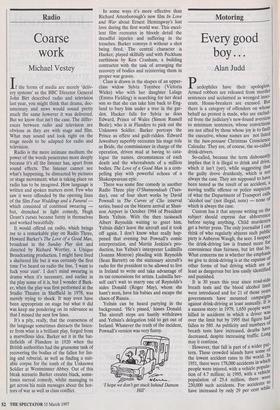Radio
Coarse work
Michael Vestey
If the forms of media are merely 'deliv- ery systems' as the BBC Director General John Birt described radio and television last year, you might think that drama, doc- umentary and news would sound pretty much the same however it was delivered. But we know that isn't the case. The differ- ences between radio and television are obvious as they are with stage and film. What may sound and look right on the stage needs to be adapted for radio and television.
Radio is the more intimate medium; the power of the words penetrates more deeply because it's all the listener has, apart from sound effects. The listener cannot see what's happening, be distracted by pictures or stage movement; what is taking place on radio has to be imagined. How language is written and spoken matters most. Few who saw it were offended by the opening lines of the film Four Weddings and a Funeral which consisted of continual swearing but, drenched in light comedy, Hugh Grant's curses became funny in themselves and worked beautifully.
It would offend on radio, which brings me to a remarkable play on Radio Three, Howard Barker's The Love of a Good Man, broadcast in the Sunday Play slot and directed by Richard Wortley, a Unique Broadcasting production. I might have lived a sheltered life but it was certainly the first time I've heard on radio the line, 'I want to fuck your cunt'. I don't mind swearing in drama when it's necessary, and earlier in the play some of it is, but I wonder if Bark- er, when the play was first performed at the Studio Theatre in Sheffield in 1978, was merely trying to shock. It may even have been appropriate on stage but what it did was keep me pondering on its relevance so that I missed the next few lines.
It's a pity, really, that the coarseness of the language sometimes distracts the listen- er from what is a brilliant play, forged from a marvellous idea. Barker set it in the bat- tlefields of Flanders in 1920 when the British authorities had the gruesome task of recovering the bodies of the fallen for list- ing and reburial, as well as finding a suit- able corpse for the tomb of the Unknown Soldier at Westminster Abbey. Out of this bleak scenario Barker creates black, some- times surreal comedy, whilst managing to get across his main messages about the hor- rors of war as well as class conflict. In some ways it's more effective than Richard Attenborough's new film In Love and War about Ernest Hemingway's lost love during the first world war. This excel- lent film recreates in bloody detail the dreadful injuries and suffering in the trenches. Barker conveys it without a shot being fired. The central character is Hacker, played skilfully and with Peckham earthiness by Ken Cranham, a building contractor with the task of arranging the recovery of bodies and reinterring them in proper war graves.
Class is drawn in the shapes of an upper- class widow Sylvia Toynbee (Victoria Wicks) who with her daughter Lalage (Emma Fielding) is searching for her dead son so that she can take him back to Eng- land to bury him under a tree in the gar- den. Hacker falls for Sylvia as does Edward, Prince of Wales (Simon Russell Beale), who is in Flanders to pick out the Unknown Soldier. Barker portrays the Prince as effete and guilt-ridden. Edward Jewesbury superbly recreates his stage role as Bride, the commissioner in charge of the operation, driven mad at having to cata- logue the names, circumstances of each death and the whereabouts of a million bodies. The Love of a Good Man is a com- pelling play with powerful echoes of a Shakespearean epic.
There was some fine comedy in another Radio Three play O'Shanriondoah (Tues- day), one of four short works by David Pownall in The Curves of Clio interval series, based on the bizarre arrival at Shan- non Airport in October 1994 of President Boris Yeltsin. With the then taoiseach Albert Reynolds waiting to greet him, Yeltsin didn't leave the aircraft and it took off again. I don't know what really hap- pened that evening but Pownall's comic interpretation, and Martin Jenkins's pro- duction, has Yeltsin's interpreter Ludmilla (Joanna Monroe) pleading with Reynolds (Sean Barrett) on the stationary aircraft's radio for the president to be allowed to live in Ireland to write and take advantage of its tax concessions for artists. Ludmilla her- self can't wait to marry one of Reynolds's aides Donald (Roger May), whom she hasn't seen, have his babies and escape the chaos of Russia.
Yeltsin can be heard partying in the background. 'He's pissed,' hisses Donald. The aircraft steps are hastily withdrawn and Yeltsin's delegation told to get out of Ireland. Whatever the truth of the incident, Pownall's version was very funny.
'I hope we don't get stuck behind Damon Hill'


































































 Previous page
Previous page